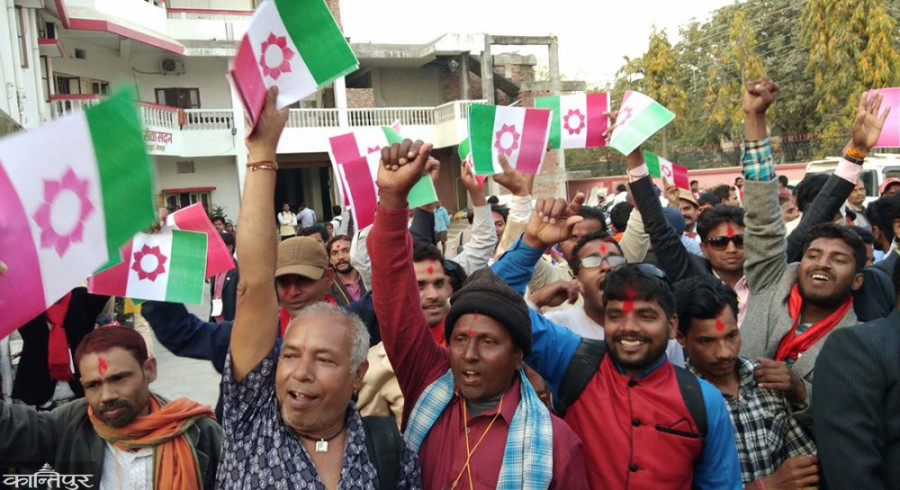National
After quitting ‘Free Madhes’ campaign, CK Raut launches a new party
Six years of struggle to generate momentum for creating a separate Madhes. In and out of jail for about a dozen times on various charges. Behind bars for five consecutive months since October last year.
Tika R Pradhan
Six years of struggle to generate momentum for creating a separate Madhes. In and out of jail for about a dozen times on various charges. Behind bars for five consecutive months since October last year. And months-long negotiations. All that culminated in a deal between the government and CK Raut on March 8.
And days after signing the deal with the government, Raut’s Alliance for Independent Madhes said on Monday that it was making forays into peaceful politics to continue the struggle for the rights of the people.
Concluding a two-day meeting of the National Council of the alliance in Lahan, Siraha on Monday, Raut's group said it was launching a new political force named Janamat Party.
The council meeting also welcomed the 11-point agreement signed with the government two weeks ago, terming the move a “historical event” and “extraordinary achievement for the Madhesi people”.
A statement issued by Abdul Khan, who has undersigned the statement as a central member of Janamat Party, calls on the government to withdraw all the cases filed against its members and to release all those who are behind bars. “A three-member team has been formed under Chandan Singh to take initiatives to ensure compensation for the family of Ram Manohar Yadav, who had died in police custody and to make arrangements for employing a member of the family,” the statement reads.
Raut had signed the deal with the government committing to honouring the constitution and sovereignty, integrity and dignity of Nepal, a day after he was released by the Supreme Court.
Raut, a PhD from Cambridge University, had been gathering people in the plains under the umbrella of his Alliance for Independent Madhes, saying that the only way to ensure the rights of Madhesis was by creating a separate Madhes.
The government-Raut deal, however, ran into controversy immediately, as the agreement's second point talked about "jana abhimat", which many, including Raut's supporters, translated as referendum.
Home Minister Ram Bahadur Thapa, who had signed the deal with Raut on behalf of the government, had even faced a tough time convincing lawmakers that the government had not agreed to a referendum to decide the fate of Madhes and that the phrase "jana abhimat" in no way meant referendum.
During the alliance’s two-day meeting, Raut did not mention the term referendum.
“We have decided to register a new party at the Election Commission at the earliest,” Chandan Singh told the Post after the council meeting.
Only time will tell how Raut fares in politics, but observers said it won’t be easy for Raut’s Janamat Party to create space in Madhes as well as Nepal’s political landscape.
“I don’t think Raut’s party will be able to make much impact on the politics of Madhes,” said Bijay Kant Karna, a professor of political science.
“Raut did have followers once and they were basically a group of people who were frustrated with the existing Madhesi political parties and futile Madhes movements. But I don’t think he has that huge following now. On top of that, Raut barely connects with Madhes agenda like constitution amendment and proportional representation.”
Though Raut has announced his own political party, he has stopped short of coming up with his political ideology—as to what kind of political line he will follow to translate his pledge to ensure people’s rights into action.
Since the March deal is viewed by some as Oli’s bid to gain political mileage and Raut’s quest for safe-landing, they even say Raut could become a pawn for the Oli administration.
“I wonder if the ruling party is going to use Raut’s party against the existing political parties of Madhes,” said Karna.
In Madhes politics, Raut’s party now will find the Rastriya Janata Party-Nepal and the Sanghiya Samajbadi Forum-Nepal as its main contenders.
Madhesi politics has always been fraught with splits, squabbling and one-upmanship. Madhesi people have time and again pinned hopes on the Madhesi parties—only to be disappointed.
“Raut has attractive personality. He is educated. He has proved that he can sacrifice [himself] for the people. Now if he focuses on socio-economic transformation of Madhes, he can make a good leader for Madhes,” Tula Narayan Shah, a political analyst who follows Madhes issues closely, told the Post.
“None of the existing Madhesi political parties has focused on socio-economic issues,” Shah added. “Now with the constitution in place and federalism in practice, there is little the parties from Madhes can do with what they call their political agenda. Madhes is in immediate need of socio-political transformation and Raut has a scope to succeed.”
Even though Raut has decided to join mainstream politics and started a party, it will take some time for him to get rid of the tag he has carried for many years—that is of a secessionist. Until the deal with the government, Raut and his alliance were viewed by the government as major threat to national security.
By managing to make Raut quit his “Free Madhes” campaign, the government has sent a message across that there is no room for secessionist politics in Nepal, but Raut, said Karna, needs to work hard to build his party.
“To ensure his space in politics, Raut needs to go through several tests,” Karna told the Post. “The progress of Janamat Party will depend on the strategic moves Raut makes in the coming days.




 13.12°C Kathmandu
13.12°C Kathmandu














